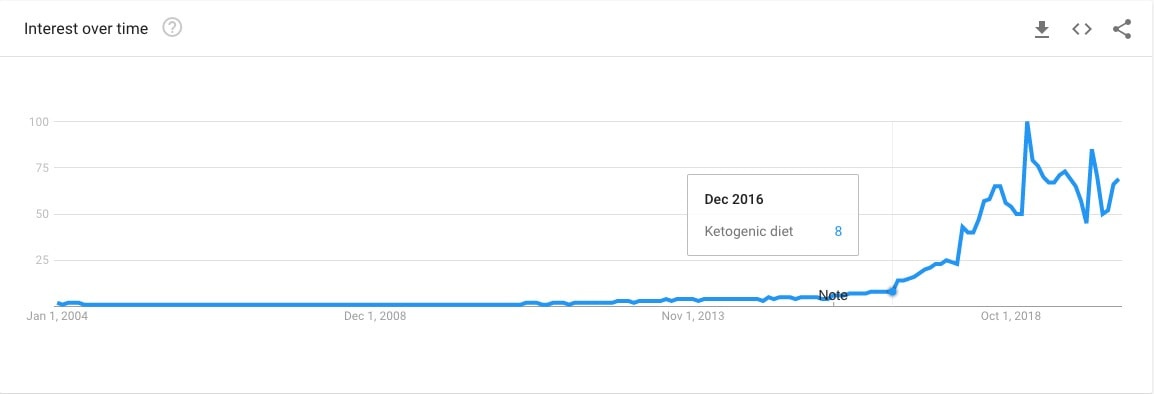|
SEARCH My Blog (Opens in new tab)
If my wife were pregnant, I'd prefer she avoided ketoHigh-Fat Diets are becoming increasingly popular, especially skyrocketing at the beginning of 2018, according to Google Trends. A just-published research paper might take the gloss off their popularity. Fasting and other dietary regimens have been used to treat epilepsy since at least 500 BC. To mimic the metabolism of fasting, the ketogenic diet (KD) was introduced by modern physicians as a treatment for epilepsy in the 1920s. For two decades, this therapy was widely used, but with the modern era of antiepileptic drug treatment, its use declined dramatically. As its therapeutic use declined, enthusiasts picked up on the ketogenic diet as a lifestyle choice. The interest of enthusiasts goes back decades to the 1970s when Dr Atkins popularised his very-low-carbohydrate diet for weight loss. What has changed recently is that KD has become a cause celebre, promoted by influencers, celebrities and sacked anti-vaxxer cooking show hosts.
There is good research, but not long-termAlong with the rise of the KD influencers, there has also been an enormous rise in well-conducted research. There is now strong evidence that for some people, the diet assists with weight loss and blood sugar control, and potentially aids in the management of Type 2 diabetes. The main criticism of this positive research is that the long-term effects are not yet known. Harvard Health says: A ketogenic diet could be an interesting alternative to treat certain conditions and may accelerate weight loss. But it is hard to follow, and it can be heavy on red meat and other fatty, processed, and salty foods that are notoriously unhealthy. We also do not know much about its long-term effects, probably because it's so hard to stick with that people can't eat this way for a long time. It is also important to remember that "yo-yo diets" that lead to rapid weight loss fluctuation are associated with increased mortality. And disagreementPhysician and plant-based diet proponent Shivam Joshi remarked on the shortage of long-term studies of the diet. "The keto diet may not be worth pursuing, even for diabetics or the obese, if we are mortgaging those diseases for higher rates of heart disease or colon cancer, a possibility given the low amounts of fiber consumed on these diets," he wrote on Medium. On the other hand, Dr Mark Hyman, medical director at the highly respected Cleveland Clinic's Center for Functional Medicine, is an advocate of the keto diet. When pregnant? That's even more controversialA report in the latest issue of Molecular Science (June 2020) caught my attention, due to the popularity of High Fat Diets. Rats and mice are widely used in medical testing because their genetic, biological and behaviour characteristics closely resemble those of humans. The report, "Maternal high-fat diet exaggerates diet-induced insulin resistance in adult offspring", explained the mechanism by which the offspring of mice mothers fed on a High Fat Diet (HFD) developed insulin resistance, i.e. a precursor of diabetes. What particularly struck me was not the complex mechanism that caused this - although this no doubt delighted the researchers - but that this outcome was said to be "well known". To quote the research paper: Maternal nutrition throughout pregnancy and lactation has been well-recognised to increase the offspring's risk of obesity and metabolic disorders across the life span [here, here, here, here, here]. The study proved that there is a metabolic pathway which promotes insulin resistance in the offspring of mice fed a high-fat diet. What does that say about women, and the risks of a high-fat diet? I'm not at all qualified to say. The popular advice is conflicting:
It's confusing, right? Mice are our best surrogates, for researchObviously, the kind of research done with pregnant mice cannot be done with humans. But we do know that many biological outcomes of related experiments on mice reflect the very similar results in humans. That’s the point of using mice and rats for such research. Research with pregnant mice - "A ketogenic diet during gestation results in alterations in embryonic organ growth" (2013) - concluded thus: A ketogenic diet during gestation results in alterations in embryonic organ growth. Such alterations may be associated with organ dysfunction and potentially behavioural changes in postnatal life. I can't suggest what anyone else should do. It would be best if you got professional medical advice. Based on what I have now read, if my own wife were to become pregnant I would prefer that she followed a highly nutritious regular diet tailored for the demands of gestation. Good luck. > More posts to help you with EXERCISES > More posts to help you with DIABETES > If you are a @MEDIUM reader my publication Body Age Buster has hundreds of categorised posts which I have written especially for men and women over 50 Follow me on Quora for more health and fitness tips.
If you valued this article >> Follow me Leave a comment >> Share it >> Stay healthy If you have any questions email me and I will get back to you. Latest: get your free customised fitness plan designed uniquely for you.
|
ChoicesSince I was diagnosed at 50 with Type 2 diabetes I've been learning how to do bone-building fitness training which lowers my age. You can too. It's your choice. Walter Categories
All
Archives
May 2023
|


 RSS Feed
RSS Feed 


